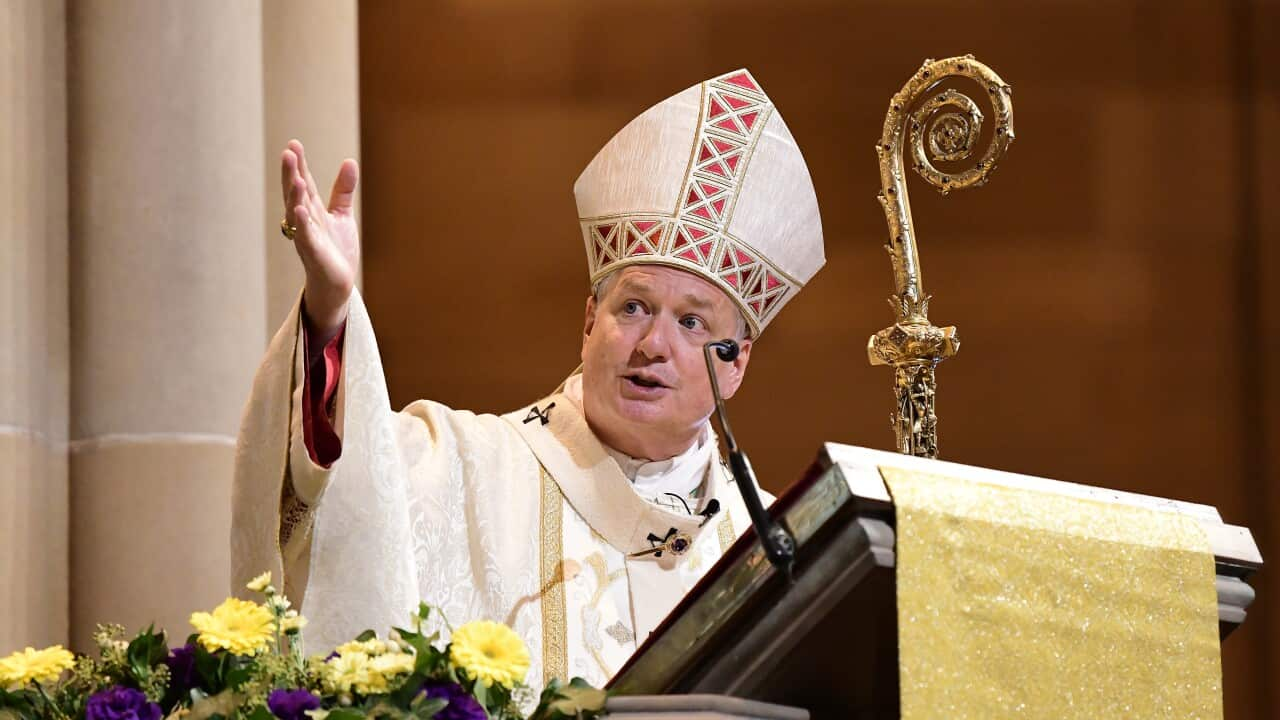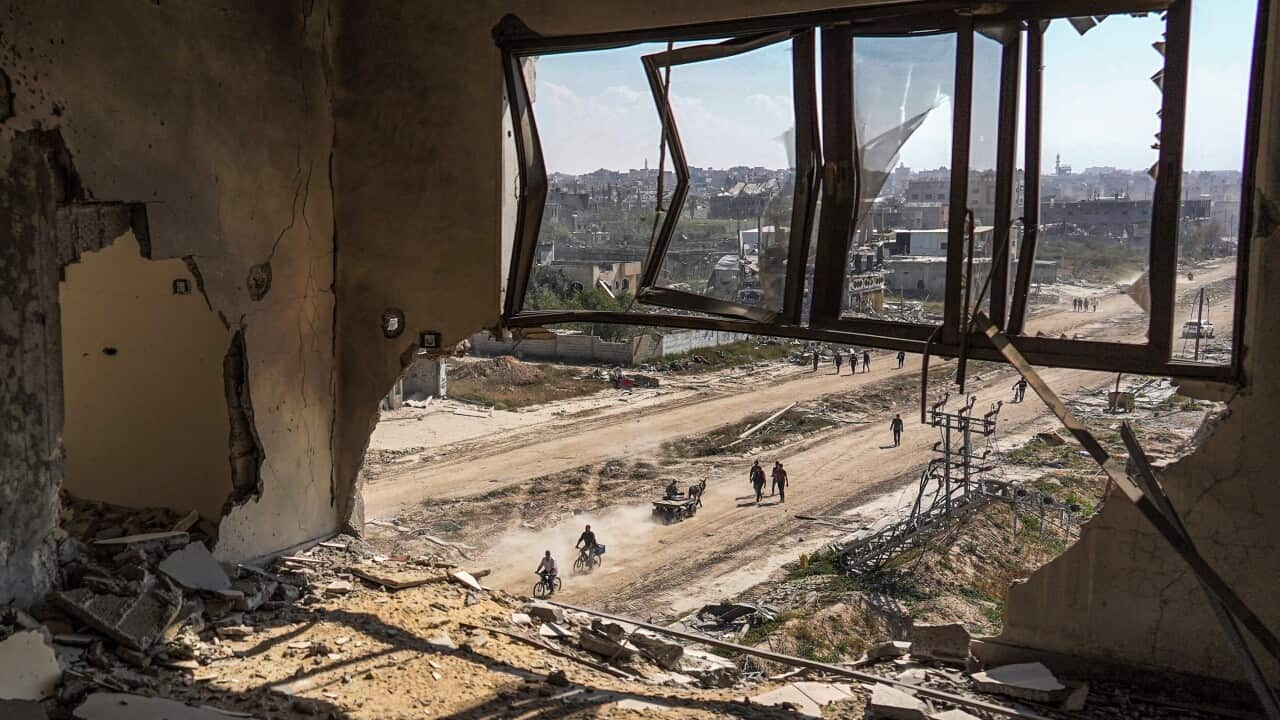Key Points
- Around 15 million Jewish people around the world will celebrate Passover this week.
- The festival is laden with symbolism and represents the empowerment of Jewish people.
- This year, Jews in Australia say the festival will provide them with unity and strength.
For Anna Feldman, Passover will be a particularly special occasion this year, like it will be for thousands of other Jews across Australia.
She's travelled with her husband Asher Solomon and 11-year-old son Kiva from Emerald Beach near Coffs Harbour on the NSW north coast to Sydney, to be with extended family. And as they sit down to the festive meal, Seder, Anna says she'll be relishing the chance to unite spiritually with other Jewish people around the globe.
"I think at every Seder table we will be remembering our collective connection and our collective vision for freedom, purpose, joy and all the things that really anchor a sense of Judaism and empowerment," she told SBS News.
Meanwhile, Rabbi Dovid Slavin, who runs food charity Our Big Kitchen, will be welcoming over 100 people to the Harry Triguboff Centre in Sydney's Bondi to eat, sing and share stories.
"In the synagogue, there's lots of people, children, activity, singing, sharing of ideas and of course, lots of food. It's for people who are not able to have their own place or people who want to be with a bigger gathering.
"Nobody is excluded."

Rabbi Dovid Salvin (centre-left) with colleagues at Our Big Kitchen, a massive kitchen operation in Bondi that distributes around 80,000 meals a year to the neediest Australians. Source: Supplied
What does Passover symbolise?
Passover commemorates the liberation of the Jewish people from slavery in Egypt in the 13th century BC.
Also called Pesach, or "to pass over" in Hebrew, it can also be viewed as the birth of the people of Israel. For Jewish people, it marks the moment their people became a nation.
The Plagues of Egypt are intimately connected to . According to the Book of Exodus, these were 10 disasters inflicted on biblical Egypt by the God of Israel (Yahweh) in order to convince the Pharaoh to free the enslaved Israelites, who were led to freedom by Moses.
The final plague involved the slaying of the first-born sons of Egyptians, whereas the first-born sons of the Israelites were "passed over".
Every Passover, stories of the 10 plagues and exodus from Egypt are recounted, as has been done through generations of families over thousands of years.
"These stories never change," explained Anna. "They give us an opportunity to remember and celebrate the redemption of the Jewish people."

Anna Feldman and Asher Solomon have travelled from regional Australia to Sydney to celebrate Passover with extended family. Source: SBS News
"We have our own biases, our own limitations saying, 'I can't do this, I'm not good enough'."
When does Passover take place and how many celebrate?
Passover takes place this year from 22 to 30 April. In the Jewish calendar, this corresponds to the 14th and 21st days of the month of Nissan in the year 5784.
Passover celebrations last one week: seven days in Israel and eight days for Jews living in the diaspora.

Credit: SBS News
Significant Jewish populations also reside in France, Canada, the UK, Argentina, Russia, Germany and Australia, where around 118,000 Jewish people are expected to celebrate Passover this week.
Festival of food
The festive meal, the Seder, takes place on the first evening, or the first two evenings for the diaspora, so Monday and Tuesday night, with .
Although the composition of the meal varies from country to country, three elements are present everywhere: unleavened bread, bitter herbs such as horseradish, celery and Romaine lettuce, and a bone.
The bread recalls the haste with which the Israelites had to flee, meaning they could not leaven their bread; the herbs symbolise the harshness of slavery; and the bone represents sacrifice.
A hard-boiled egg tends to feature, representing sacrifice and embodying hope and consolation.

The festive meal of Passover, known as Seder, is highly symbolic. Source: Getty / Marina Moskalyuk
"Everything on the Seder plate represents something in the story of the exodus from Egypt, this journey of freedom and this discovery of our Promised Land," Anna said.
"Most importantly, all leavened bread is removed and is replaced with something that most people would recognise as matzah, which looks like a very dry, large cracker."
Rabbi Slavin said gatherings can be quite large.
"Extended family or other guests will go to each other to create a much broader experience because there's lots of things that need to be done and not everybody's capable of putting together the festive meal."

Extended families often gather for Seder, with additional guests often present. Source: Getty / Sam Feinsilver
What happens the rest of the week?
During the rest of the week, Jewish people abstain from consuming food containing fermented grains, including wheat, barley, oats, rye and spelt, known as Chametz. This also includes cake and beer.
It is also forbidden to possess or profit from these foods, hence many do a spring clean to chase away food with leavening agents from their home, which could not be taken during the flight from Egypt.
Kitchen utensils must be cleaned with fire or boiling water if they are not reserved for use during Passover.
Rabbi Slavin says during the week Jewish people make trips to the synagogue, and enjoy family time and outings with the children.
Charities also hand out parcels to those in need.
Will Passover carry even more meaning this year?
Anna says this year Jewish people will be thinking about the 133 Israeli hostages who remain in Gaza.
"There won't be a family that won't be thinking about our hostages, women, men, children, boys that are still there. 'Let my people go' has a whole other meaning this year. We're still crying out as a people to be freed from persecution," she said.
"Jewish people all over the world are concerned about the rise in antisemitism. There's an even more spiritual connection to our story this year."
Rabbi Slavin says he's seen a "much stronger response" to Passover this year than previous years.
"This is just what the doctor ordered. People can come together and experience Passover from a religious perspective or psychological perspective.
"Passover tells us that we've been through significant things in the past and we've managed to get through them, and this should be no different. We should see this through, we should be able to be successful and we shouldn't give into despair.
"Passover allows us to connect to ourselves, to each other and to our past. There are so many beautiful aspects."
Israel has bombarded Gaza since Hamas' 7 October attack in which more than 1,200 people, including an estimated 30 children, were killed and over 200 hostages taken, according to the Israeli government. That incident was a significant escalation in the long-standing conflict between Israel and Hamas.
More than 33,175 people have been killed in Gaza since, mostly women and children, according to the local health ministry.
The 7 October attack was a significant escalation in the long-standing conflict between Israel and Hamas.
— With reporting by Agence France-Presse.











